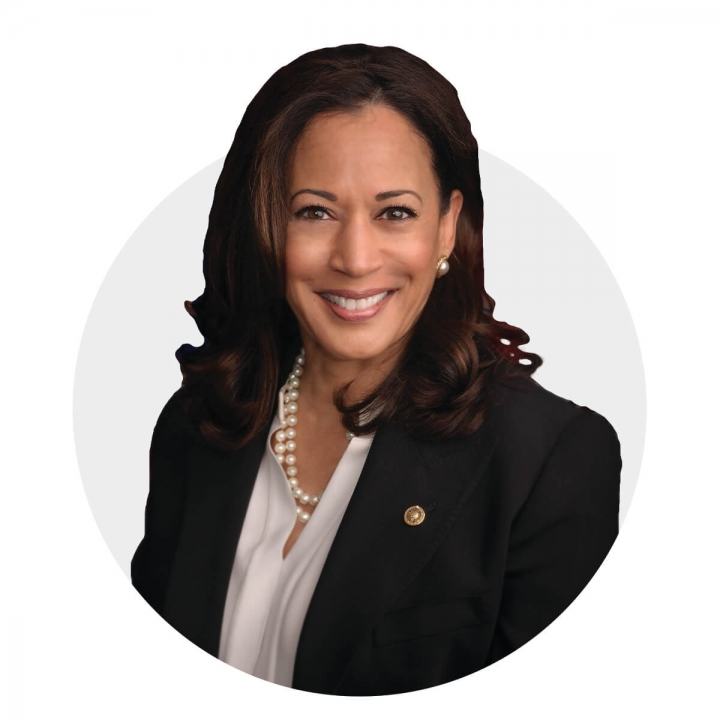Kamala Harris on Criminal Justice Reform
In 2004, as District Attorney of San Francisco, Harris refused to seek the death penalty against a man convicted of shooting police officer Isaac Espinoza. She faced opposition from fellow Democrats, including Senator Dianne Feinstein (D-CA) who called for the death penalty at the officer’s funeral. Following that incident, she received almost no support from police groups during her first run for attorney general in 2010.
Harris created the “Back on Track” program which allowed first-time drug offenders, including drug dealers, to get a high school diploma and a job instead of prison time. Adams, Harris’s spokesperson, noted that the program started in 2005, “when most prosecutors were using a ‘tough on crime’ approach.”
Harris promises to end the War on Drugs.
Harris would create grant programs to provide services to those most adversely impacted by the War on Drugs, provide states and localities with funds to make loans to assist small businesses in the marijuana industry, and provide funds for programs that minimize marijana licensing and employment barriers.
Harris is a cosponsor of the Justice Safety Valve Act, which would eliminate mandatory minimums by allowing judges to issue sentences below the mandatory minimum.
Harris would remove the clemency process from the Department of Justice due to inherent conflicts of interest.
Harris would create a new National Criminal Justice Commission to study state and federal criminal justice systems.
Harris would end the use of private prisons.
Harris would work to end juvenile incarceration, life sentences of children, the transfer of children to adult prisons, solitary confinement for children, and criminal charges for school-based disciplinary behavior.
Harris would mandate that federal prisons provide educational and vocational training, and mental health and addiction treatment.
Harris supports ban the box.
Harris introduced the Fair Chance at Housing Act of 2019 with Rep. Alexandria Ocasio-Cortez, which helps to remove barriers to obtaining federal housing assistance for individuals with criminal records.
Harris would create a National Police Systems Review Board.
Harris would double the size of the DOJ’s Civil Rights Division.
Harris would end the use of fines and fees that criminalize the poor, including ending suspension of driver’s licenses for unpaid fines.
Harris would increase prosecutorial accountability and would increase support for public defenders.
Harris pledges to end mass incarceration, and invest in community-based programs to reduce crime and promote safe and healthy communities.
Harris promises to make significant federal investments into evidence-based, non-carceral social supports and programs to improve public safety and reduce violence, including investing in jobs, job training, housing, transportation, food security, education, medical care and mental health care.
Harris will legalize marijuana on the federal level and expunge marijuana convictions.
Harris pledges to invest in reducing the incarceration of women convicted of non-violent offenses.
Harris would end mandatory minimums at the federal level.
Harris would form clemency/sentencing review units to significantly increase the use of clemency.
Harris would end the federal crack and powder cocaine sentencing disparity.
Harris pledges to reform community supervision by shortening the length of probation and ending jail time for technical violations of community-based supervision.
Harris would create a Bureau of Children and Family Justice.
Harris would invest in Back-on-Track programs.
Harris would mandate that federal prisons provide a reentry educational course.
Harris would end federal bans on formerly-incarcerated and arrested individuals access to public housing, student loans, SNAP and professional work licenses.
Harris supports automatic expungement and sealing of offenses that are not serious or violent after 5 years.
Harris supports independent investigations of officer-involved shootings.
Harris would end the death penalty and solitary confinement.
Harris would reinstate President Obama’s executive order to de-militarize police departments.
Harris would end money bail.
“I’ve been consistent my whole career. My career has been based on an understanding, one, that my duty as a prosecutor was to seek and make sure that the most vulnerable and voiceless among us are protected, and that is why I have personally prosecuted violent crime that includes rape, child molestation, and homicide. And, I have also worked my entire career to reform the criminal justice system, understanding, to your point, that it is deeply flawed and in need of repair, which is why, as attorney general for example, I led the Department of Justice, which is the largest state department of justice in any state, in California and implemented the first of its kind in the nation, implicit bias and procedural justice training for police officers. It is why I created the first in the nation for any department of justice an open data initiative that we named “Open Justice” for the first time making transparent and showing the public statistics around deaths in custody, arrest rates by race, and making that information available to the public. I instituted a policy around requiring the agents who worked in my division, which is the first of its kind for a state agency, to wear body cameras. I created an initiative back when I was DA, and this was when, by the way, this was the 90’s and the early 2000’s, where you could talk to DAs around the country and you’d mention the word re-entry, and they didn’t know what you were talking about. This was when there was a “tough-on-crime” mentality, and I created one of the first in the nation initiatives that was focused on re-entering former offenders by getting them jobs, and training, and counseling, and it ended up being something that, thankfully, in these ensuing 15 years, is something that is regularly talked about by district attorneys, but back when we created this, that was not happening. On the issue of the death penalty, I am personally opposed to the death penalty. I’ve always been opposed to the death penalty, and that’s not gonna change.”
Town Hall with Senator Kamala Harris
CNN, January 28, 2019
Read More
Kamala Harris Was Not a ‘Progressive Prosecutor’
The New York Times, January 17, 2019 | Lara Bazelon
Kamala’s Plan to Transform the Criminal Justice System and Re-Envision Public Safety in America
Candidate Website
Kamala Harris’s criminal justice reform plan, explained
Vox, September 9, 2019 | German Lopez
Kamala Harris on Overdose Prevention Sites
Harris has not issued specific statements to this issue.
Read More
How the Democratic presidential candidates would combat the opioid epidemic
Vox, September 10, 2019
Kamala Harris on HIV Getting to Zero
Harris supports Medicare for All
Harris supports increasing federal funding for HIV research
Harris would push for the passage of the PrEP Access and Coverage Act, which she introduced in July 2019. This bill would require public and private health insurers to cover PrEP.
“Ensuring that PrEP, as well as the required tests and follow-up visits, are covered cost-free as part of all insurance plans (including Medicare and Medicaid) will help make sure everyone who could benefit from the medication is able to take it and help increase awareness about steps we can take to prevent further transmissions.”
BREAKING: 2020 Presidential Candidates Tell Us Their Plans to End HIV
HIV+Magazine, September 9, 2019 | Jacob Anderson-Minshall
Read More
2020 Presidential Candidate HIV Questionnaire
AIDS United, 2019
Every 2020 Democratic Candidate’s Plan to End the HIV/AIDS Epidemic
Lifehacker, September 11, 2019 | Josh Ocampo
BREAKING: 2020 Presidential Candidates Tell Us Their Plans to End HIV
HIV+Magazine, September 9, 2019 | Jacob Anderson-Minshall
S. 1926 Prep access and Coverage Act
Congress Website, June 2019 | Kamala Harris
Kamala Harris on Hepatitis C Treatment Access
Harris has not issued specific statements to this issue.
Read More
Kamala Harris releases ‘Medicare for all’ plan with a role for private insurers
NPR, July 19, 2019 | Danielle Kurtzleben
Kamala Harris on Voting Rights Restoration
Harris supports restoring voting rights to felons after their time has been served. She opposes voting rights for imprisoned felons, but has expressed willingness to reconsider this position. As California Attorney General in 2016, Harris supported a state law to restore voting rights to individuals serving time under community supervision. The bill would also expand voting rights to those serving a felony sentence in county jail.
“We right now have got a lot of work to do with the people in our country who have served their time and have been prohibited from voting… Currently in our country there are 6 million people who have served their time and are still prohibited from voting, and that has been an area of focus for me for quite some time, and we’ve got to address that and address that immediately, and so that is one of my first areas of focus and concern… Do I think that people who commit murder, people who are terrorists, should be deprived of their rights? Yeah, I do. I’m a prosecutor, I believe that in terms of, there has to be serious consequence for the most extreme types of crimes.”
Harris on whether felons should vote in prison: ‘There has to be serious consequences’ for extreme crimes
CNN.com, April 23, 2019 | Kate Sullivan
Read More
Harris on whether felons should vote in prison: ‘There has to be serious consequences’ for extreme crimes
CNN.com, April 23, 2019 | Kate Sullivan
Which 2020 candidates think incarcerated felons should be able to vote?
CBS News, June 14 2019 | Alexandra Chaidez
Attorney General Kamala D. Harris Endorses Legislation to Expand Voting Rights
Office of Attorney General Kamala D. Harris, June 20, 2016
Kamala Harris on Syringe Access
Harris is a co-sponsor of Elizabeth Warren's proposed CARE Act, which would commit $100 billion over 10 years to fund addiction treatment and harm reduction programs across the country.
“We must take action to increase access to get a wide range of services in our communities, including naloxone to prevent overdoses and other treatments to help people in the many stages of their recovery. I am a cosponsor of the Comprehensive Addiction Resources Emergency (CARE) Act which would provide state and local governments with $100 billion in federal funding over the next ten years to deploy those kinds of resources.”
Kamala Harris Clarifies Her HIV Policy Positions
HIV+Magazine, September 9, 2019
Jacob Anderson-Minshall
Read More
Kamala Harris Clarifies Her HIV Policy Positions
HIV+Magazine, September 9, 2019
Jacob Anderson-Minshall
How the Democratic presidential candidates would combat the opioid epidemic
Vox, October 24, 2019
German Lopez
Kamala Harris on Substance Use Treatment Access
Harris's Medicare for All plan guarantees treatment availability for all
In addition to her Medicare for All plan, which guarantees treatment availability for all, Harris is co-sponsor of the Comprehensive Addiction Resources Emergency (CARE) Act which would provide state and local governments with $100 billion in federal funding over the next ten years to support addiction treatment and harm reduction services.
“In 2017, the administration declared the opioid crisis a public health emergency, but the fund they used to deal with it had only — I kid you not — $57,000 in it. That represents less than one dollar for each person who died of a drug overdose that year. It’s unconscionable… We need to make sure that people who are addicted have access to medication-assisted-treatment (MAT) — drugs like buprenorphine which prevents withdrawal symptoms and cravings without producing the kind of high that heroin or OxyContin does. Many insurance companies will cover the cost of opioids while charging more than $200 a month for buprenorphine. That has to change. We have to change it.”
(The Truths We Hold, by Kamala Harris, pp. 206-207, Jan 8 2019)
The Opioid Crisis Requires Emergency Mobilization
The Truths We Hold pp. 206-207, January 8, 2019 | Kamala Harris
Read More
Kamala Harris Clarifies Her HIV Policy Positions
HIV+Magazine, September 9, 2019 | Jacob Anderson-Minshall
The Opioid Crisis Requires Emergency Mobilization
The Truths We Hold pp. 206-207, January 8, 2019 | Kamala Harris
How the Democratic presidential candidates would combat the opioid epidemic
Vox, October 24, 2019 | German Lopez
Kamala Harris on Drug Decriminalization
Harris supports legalized marijuana.
Harris is co-sponsor of the Marijuana Justice Act of 2019 which would legalize marijana by removing it from Schedule 1 of the Controlled Substances Act.
According to her campaign website, Senator Harris favors expunging records for marijuana offenses, investing in re-entry support and job training, and stopping the reporting of convictions on job applications.
Harris is the chief Senate sponsor of the proposed Marijuana Opportunity Reinvestment and Expungement (MORE) Act of 2019, which would decriminalize and deschedule cannabis, provide for reinvestment in certain persons adversely impacted by the War on Drugs, and provide for expungement of certain cannabis offenses.
“Times have changed — marijuana should not be a crime. We need to start regulating marijuana, and expunge marijuana convictions from the records of millions of Americans so they can get on with their lives. As marijuana becomes legal across the country, we must make sure everyone — especially communities of color that have been disproportionately impacted by the War on Drugs — has a real opportunity to participate in this growing industry.”
Harris, Nadler Introduce Comprehensive Marijuana Reform Legislation
U.S. Senate website for Kamala Harris, July 23, 2019
Read More
Kamala’s Plan to Transform the Criminal Justice System and Re-envision Public Safety in America
Campaign website for Kamala Harris, 2019
S.2227-MORE act of 2019
Congress Website, July 2019 | Kamala Harris
Kamala Harris on Naloxone
Harris signed onto a 2017 letter to President Trump, asking him to follow the recommendations of his Commission on Combating Drug Addiction and the Opioid Crisis and allow the government to negotiate lower prices for naloxone.
In the July 2019 Democratic debate, Senator Harris stated that an anti-overdose syringe costs $4,000, out of the reach of many Americans who struggle with opioid addiction: “In America today… for those people who have overdosed from an opioid, there is a syringe that costs $4,000 that will save their life... It is immoral. It is untenable... and it must change with Medicare for all.” New York Times later published a fact-checking report of the debate, saying, “A product called Evzio, an auto-injector that contains the anti-overdose medicine naloxone, does cost about $4,000 for a two-dose kit. But at the end of last year, the manufacturer, Kaléo, said it would soon release a cheaper generic alternative that will cost $178. In addition, the price of a different, syringe form version of naloxone currently retails for about $80.”
“We must take action to increase access to get a wide range of services in our communities, including naloxone to prevent overdoses and other treatments to help people in the many stages of their recovery. I am a cosponsor of the Comprehensive Addiction Resources Emergency (CARE) Act which would provide state and local governments with $100 billion in federal funding over the next ten years to deploy those kinds of resources. “
Kamala Harris Clarifies Her HIV Policy Positions
HIV+Magazine, September 9, 2019 | Jacob Anderson-Minshall
From a 2018 letter to United States Secretary of Health and Human Services Alex Azar, sent by 17 senators: “No police officer, no firefighter, no public health provider, and no person should be unable to save a life because of the high price,” the lawmakers wrote.“By bringing down the cost, we can get this life-saving drug in the hands of more people as called for by the Surgeon General. Doing so will save countless lives.”
Klobuchar, Smith, Senators Call on Administration to Take Immediate Action to Reduce Price of Naloxone, a Life-Saving Opioid Overdose Reversal Drug
Klobuchar Senate Website, April 30, 2018
Read More
Blumenthal, Murphy Call on President To Allow Government to Negotiate Lower Prices for Naloxone, a Life-Saving Opioid Overdose Reversal Drug
Office of Senator Richard Blumenthal, October 25, 2017
Klobuchar, Smith, Senators Call on Administration to Take Immediate Action to Reduce Price of Naloxone, a Life-Saving Opioid Overdose Reversal Drug
Klobuchar Senate Website, April 30, 2018
Debate Fact Check: What Were They Talking About, and What Was True?
The New York Times, July 31, 2019







